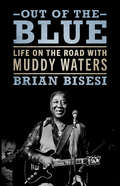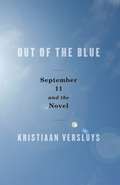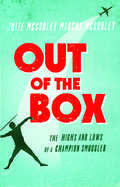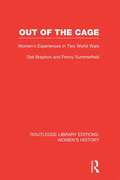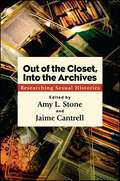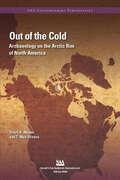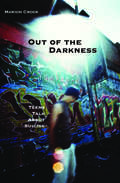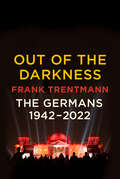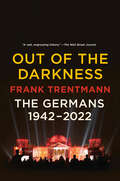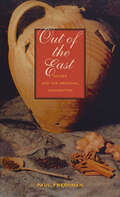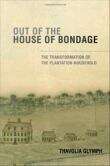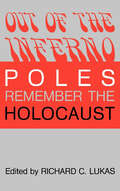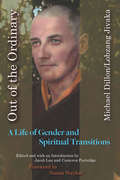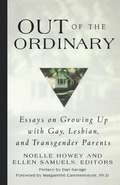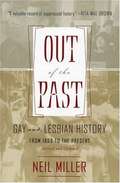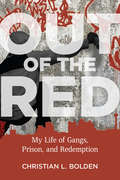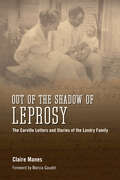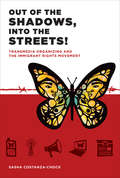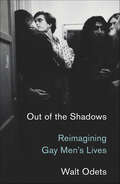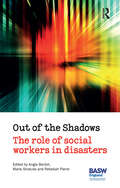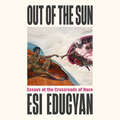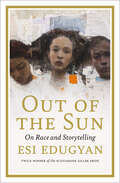- Table View
- List View
Out of the Blue: Life on the Road with Muddy Waters (American Made Music Series)
by Brian BisesiOut of the Blue: Life on the Road with Muddy Waters begins with a moment lifted from a young musician’s dreams. Brian Bisesi, a guitarist barely out of his teens, is invited on stage to fill in for a missing member of the band backing blues legend Muddy Waters. This life-changing quirk of fate opens the door into a world of challenges and opportunities that Bisesi, an Italian American reared in the comforts of a New York City suburb, can barely imagine. Despite their differences, Bisesi and Waters hit it off, and what might have been a one-night stand turns into a career. From 1978 to 1980, Bisesi works for Waters as his road manager, bean-counter, and at times his confidant, while often sitting in with the band. Bisesi’s years with the band take him to Europe, Japan, Canada, and across the United States as Waters tours—and parties—with rock gods like Eric Clapton, the Rolling Stones, a Beatle, and the gamut of musicians who came of age with Waters and introduced a younger generation to the blues. In Out of the Blue, Bisesi captures it all: from the pranks and tensions among bluesmen enduring a hard life on the road, to observations about Waters’s technique, his love of champagne and reefer, his eye for women, and his sometimes-acrid views of contemporary music. Bisesi has sharp insights into the ill-conceived management decisions that led to the dissolution of Waters’s longest-serving band in June of 1980. This book will rivet, amuse, and occasionally infuriate blues aficionados. It is a raucous and intimate portrait of the blues scene at a pivotal moment in time that fascinates music historians and blues fans alike.
Out of the Blue: September 11 and the Novel
by Kristiaan VersluysWriters have represented 9/11 and its aftermath with varying degrees of success. In Out of the Blue, Kristiaan Versluys focuses on novels that move beyond patriotic clichés and cheap sensationalism and provide new insights into the emotional and ethical impact of these traumatic events-and what it means to depict them. Versluys focuses on Don DeLillo's Falling Man, Art Spiegelman's In the Shadow of No Towers, Jonathan Safran Foer's Extremely Loud and Incredibly Close, Frédéric Beigbeder's Windows on the World, and John Updike's Terrorist. He scrutinizes how these writers affirm the humanity of the disoriented individual, as opposed to the cocksure killer or politician, and retranslate hesitation, stuttering, or stammering into a precarious act of defiance. Versluys also discusses works by Ian McEwan, Anita Shreve, Martin Amis, and Michael Cunningham, arguing for the novel's distinct power in rendering the devastation of 9/11.
Out of the Box
by Julie Mcsorley Marcus McsorleyReg Spiers arrived in England in 1964 as a world-class athlete. He returned to Australia in a box, but that was only the start of his adventures. Crazily impulsive, romantic, and free-spirited, Reg became a national hero for smuggling himself 13,000 miles home as air freight. But as his fame and sporting career faded, Reg decided to smuggle something very different. Soon, he was on the run with his girlfriend, playing a cat-and-mouse game with police on three continents. A wild road trip across India and Africa-idyllic beaches and prison hellholes, shady friends and shadier cops, gun-toting militias and drug-running gangsters -led to a court room in Sri Lanka and the fight of his life. Could Reg beat the death sentence he’d just been given, or was this box too big to climb out of?
Out of the Cage: Women's Experiences in Two World Wars (Routledge Library Editions: Women's History)
by Penny Summerfield Gail BraybonOriginally published in 1987, Out of the Cage brings vividly to life the experiences of working women from all social groups in the two World Wars. Telling a fascinating story, the authors emphasise what the women themselves have had to say, in diaries, memoirs, letters and recorded interviews about the call up, their personal reactions to war, their feelings about pay and the company at work, the effects of war on their health, their relations with men and their home lives; they speak too about how demobilisation affected them, and how they spent the years between two World Wars.
Out of the Closet, Into the Archives: Researching Sexual Histories (SUNY series in Queer Politics and Cultures)
by Amy L. Stone; Jaime CantrellFinalist for the 2016 Lambda Literary Award in LGBT Anthology presented by the Lambda Literary FoundationOut of the Closet, Into the Archives takes readers inside the experience of how it feels to do queer archival research and queer research in the archive. The archive, much like the closet, exposes various levels of public and privateness—recognition, awareness, refusal, impulse, disclosure, framing, silence, cultural intelligibility—each mediated and determined through subjective insider/outsider ways of knowing. The contributors draw on their experiences conducting research in disciplines such as sociology, African American studies, English, communications, performance studies, anthropology, and women's and gender studies. These essays challenge scholars to engage with their affective experience of being in the archive, illuminating how the space of the archive requires a different kind of deeply personal, embodied research."Out of the Closet, Into the Archives represents the exciting directions for scholarship enabled by this rapid growth of new LGBTQ archives. Although mindful of critiques of the archive as an institution of power and attentive to experiences and ephemeralities that can escape it, the essays published here practice forms of the archival turn that put relentless curiosity and unapologetic passion to use as methods for intellectual invention." — from the Foreword by Ann Cvetkovich
Out of the Cold: Archaeology on the Arctic Rim of North America (SAA Current Perspectives)
by T. Max Friesen Owen K. MasonThe Arctic rim of North America presents one of the most daunting environments for humans. Cold and austere, it is lacking in plants but rich in marine mammals-primarily the ringed seal, walrus, and bowhead whale. In this book in the SAA Press Current Perspectives Series, the authors track the history of cultural innovations in the Arctic and Subarctic for the past 12,000 years, including the development of sophisticated architecture, watercraft, fur clothing, hunting technology, and worldviews. Climate change is linked to many of the successes and failures of its inhabitants; warming or cooling periods led to periods of resource abundance or collapse, and in several instances to long-distance migrations. At its western and eastern margins, the Arctic also experienced the impact of Asian and European world systems, from that of the Norse in the East to the Russians in the Bering Strait.
Out of the Corner: A Memoir
by Jennifer GreyA deeply candid and refreshingly spirited memoir of identity lost and found from the star of the iconic film Dirty Dancing &“Jennifer Grey peels back all the artifice, denial, obfuscation, and myriad assumptions and exposes a gorgeous, human portrait of her life.&”—Jamie Lee Curtis &“We all know Jennifer Grey as a talented actress, but Out of the Corner introduces us to a gifted writer.&”—Michael J. FoxIn this beautiful, close-to-the bone account, Jennifer Grey takes readers on a vivid tour of the experiences that have shaped her, from her childhood as the daughter of Broadway and film legend Joel Grey, to the surprise hit with Patrick Swayze that made her America&’s sweetheart, to her inspiring season eleven win on ABC&’s Dancing with the Stars.Throughout this intimate narrative, Grey richly evokes places and times that were defining for a generation—from her preteen days in 1970s Malibu and wild child nights in New York&’s club scene, to her roles in quintessential movies of the 1980s, including The Cotton Club, Red Dawn, and her breakout performance in Ferris Bueller&’s Day Off. With self-deprecating humor and frankness, she looks back on her unbridled, romantic adventures in Hollywood. And with enormous bravery, she shares the devastating fallout from a plastic surgery procedure that caused the sudden and stunning loss of her professional identity and career. Grey inspires with her hard-won battle back, reclaiming her sense of self from a culture and business that can impose a narrow and unforgiving definition of female worth. She finds, at last, her own true north and starts a family of her own, just in the nick of time.Distinctive, moving, and powerful, told with generosity and pluck, Out of the Corner is a memoir about a never-ending personal evolution, a coming-of-age story for women of every age.
Out of the Darkness
by Marion CrookTeen suicide has long been considered one of society's darkest secrets; the idea of troubled young people driven to take their own lives was a tragedy too horrible to contemplate, let alone talk about openly. But the fact remains that teen suicide is an issue that refuses to go away so long as young people in crisis have nowhere to turn. But now, in this age of frank discussions about bullying, peer pressure, and issues of "difference," there is a growing sense that teen suicide is no longer a taboo subject, and that talking about it can help us to identify and acknowledge the kind of problems that lead teens to make such drastic and tragic decisions.Based on interviews with teen suicide survivors, -parents, and professionals, Marion Crook sensitively explores all aspects of teen suicide, in particular the -reasons why certain young people are driven to it. The motives are far-ranging, but central to all is a sense of desperation. Despite their dire circumstances, however, many found a way out of the darkness and into adult lives of meaning and worth.Marion Crook also examines the history of teen suicide in Western and other cultures, as well as what roles parents and schools can play in suicide prevention, and coping strategies for teens in crisis. Out of the Darkness is a book for both teens and adults that breaks the silence surrounding teen suicide, offering hope for those who think there is none.Marion Crook has spent the last fifteen years actively researching the difficulties teens face, relying on the expertise of the teens themselves. This is her twenty-third published book. She teaches at the university in Surrey, B.C. while continuing to research and write.
Out of the Darkness: The Germans, 1942-2022
by Frank TrentmannOne of The Telegraph&’s 50 Best Books of 2023A gripping and nuanced history of the German people from the Second World War to the present day, including hugely revealing new primary source material on every aspect of its transformation.In 1945, Germany lay ruined. Its citizens stood condemned by history, responsible for a horrifying genocide and war of extermination. But by the end of Angela Merkel&’s tenure in 2021, Germany looked like the moral voice of Europe, welcoming over one million refugees, holding together the tenuous threads of the European Union, and making military restraint the center of its foreign policy. At the same time, its rigid fiscal discipline and energy deals with Russian leader Vladimir Putin have cast a shadow over the present. Innumerable scholars have asked how Germany could have degenerated from a nation of scientists, poets, and philosophers into one responsible for genocide. And yet, until now, a similarly vital question has been ignored. That is, how did a nation whose past has been marked by mass murder, a people who cheered Adolf Hitler, reinvent themselves?Trentmann tells this dramatic story from the middle of the Second World War, through the Cold War and the division of East and West, to the fall of the Berlin Wall and Germany&’s struggle to find its place in the world today. This journey includes a series of internal, moral conflicts: admissions of guilt and shame vying with immediate economic concerns, restitution for some but not others, tolerance versus racism, compassion versus complicity. Through a range of voices—German soldiers and German Jews; displaced persons in limbo; East German women and shopkeepers angry about energy shortages; opponents and supporters of nuclear power; volunteers helping migrants and refugees, and right-wing populists attacking them—Trentmann paints a remarkable and surprising portrait of the German people over eighty years, showing how they became who they are today.
Out of the Darkness: The Germans, 1942-2022
by Frank Trentmann#1 Most Important Political Book of 2023, Sueddeutsche Zeitung (Germany)A Best Book of 2023, The Telegraph (Great Britain)A gripping and nuanced history of the German people from World War II to the war in Ukraine, including revealing new primary source material on Germany's transformationIn 1945, Germany lay in ruins, morally and materially. Its citizens stood condemned by history, responsible for a horrifying genocide and war of extermination. But by the end of Angela Merkel&’s tenure as chancellor in 2021, Germany looked like the moral voice of Europe, welcoming more than one million refugees, holding together the tenuous threads of the European Union, and making military restraint the center of its foreign policy. At the same time, Germany's rigid fiscal discipline and energy deals with Vladimir Putin have cast a shadow over the present. Innumerable scholars have asked how Germany could have degenerated from a nation of scientists, poets, and philosophers into one responsible for genocide. This book raises another vital question: How did a nation whose past has been marked by mass murder, a people who cheered Adolf Hitler, reinvent themselves, and how much?Trentmann tells this dramatic story of the German people from the middle of World War II through the Cold War and the division into East and West to the fall of the Berlin Wall and the struggle to find a place in the world today. This journey is marked by a series of extraordinary moral conflicts: admissions of guilt and shame vying with immediate economic concerns; restitution for some but not others; tolerance versus racism; compassion versus complicity. Through a range of voices—German soldiers and German Jews; displaced persons in limbo; East German women and shopkeepers angry about energy shortages; opponents and supporters of nuclear power; volunteers helping migrants and refugees, and right-wing populists attacking them—Trentmann paints a remarkable and surprising portrait spanning eighty years of the conflicted people at the center of Europe, showing how the Germans became who they are today.
Out of the East: Spices and the Medieval Imagination
by Paul FreedmanHow medieval Europe&’s infatuation with expensive, fragrant, exotic spices led to an era of colonial expansion and discovery: &“A consummate delight.&” —Marion Nestle, James Beard Award–winning author of Unsavory Truth The demand for spices in medieval Europe was extravagant—and was reflected in the pursuit of fashion, the formation of taste, and the growth of luxury trade. It inspired geographical and commercial exploration, as traders pursued such common spices as pepper and cinnamon and rarer aromatic products, including ambergris and musk. Ultimately, the spice quest led to imperial missions that were to change world history. This engaging book explores the demand for spices: Why were they so popular, and why so expensive? Paul Freedman surveys the history, geography, economics, and culinary tastes of the Middle Ages to uncover the surprisingly varied ways that spices were put to use—in elaborate medieval cuisine, in the treatment of disease, for the promotion of well-being, and to perfume important ceremonies of the Church. Spices became symbols of beauty, affluence, taste, and grace, Freedman shows, and their expense and fragrance drove the engines of commerce and conquest at the dawn of the modern era. &“A magnificent, very well written, and often entertaining book that is also a major contribution to European economic and social history, and indeed one with a truly global perspective.&” —American Historical Review
Out of the House of Bondage
by Thavolia GlymphThe plantation household was, first and foremost, a site of production. This fundamental fact has generally been overshadowed by popular and scholarly images of the plantation household as the source of slavery's redeeming qualities, where 'gentle' mistresses ministered to 'loyal' slaves. This book recounts a very different story. The very notion of a private sphere, as divorced from the immoral excesses of chattel slavery as from the amoral logic of market laws, functioned to conceal from public scrutiny the day-to-day struggles between enslaved women and their mistresses, subsumed within a logic of patriarchy. One of emancipation's unsung consequences was precisely the exposure to public view of the unbridgeable social distance between the women on whose labor the plantation household relied and the women who employed them. This is a story of race and gender, nation and citizenship, freedom and bondage in the nineteenth century South; a big abstract story that is composed of equally big personal stories.
Out of the Inferno: Poles Remember the Holocaust
by Richard C. Lukas“Moving testimonies recount the sadism, mass murders, deportations and imprisonment which Poles suffered at the hands of Hitler’s invading army.” —Publishers WeeklyRichard Lukas’s book, encompassing the wartime recollections of sixty “ordinary” Poles under Nazi occupation, constitutes a valuable contribution to a new perspective on World War II. Lukas presents gripping first-person accounts of the years 1939–1945 by Polish Christians from diverse social and economic backgrounds. Their narratives, from both oral and written sources, contribute enormously to our understanding of the totality of the Holocaust. Many of those who speak in these pages attempted, often at extreme peril, to assist Jewish friends, neighbors, and even strangers who otherwise faced certain death at the hands of the German occupiers. Some took part in the underground resistance movement. Others, isolated from the Jews’ experience and ill-informed of that horror, were understandably preoccupied with their own survival in the face of brutal condition intended ultimately to exterminate or enslave the entire Polish population. These recollections of men and women are moving testimony to the human courage of a people struggling for survival against the rule of depravity. The power of their painful witness against the inhumanities of those times is undeniable.“Lukas presents a selection of oral and written memoirs of some 60 Polish men and women who lived through the German occupation of Poland in World War II.” —Library Journal
Out of the Mouths of Babes: Quips and Quotes from Wildly Witty Women (Quips, Quotes, And Unforgettable Wildly Witty Women Ser.)
by Autumn StephensHumorous, startling, and shocking quotations from fierce and fiery women fill the pages of this sassy little book. Out of the Mouths of Babes continues the tradition started by author Autumn Stephens in her books Wild Women and Wild Words from Wild Women. There is no lack of confidence and sense of self in these women's sayings. More than 150 outrageously entertaining quotes present mostly well-known women in their outspoken glory. Organized into sections with titles like Gifted Gabbers, Liberated Lovers, and Brazen Biddies, Out of the Mouths of Babes is a perfect reminder to all women that the feminine spirit is alive and well!
Out of the Mouths of Serial Killers
by Mary BrettLearn why serial killers kill through their own words—including Ted Bundy, Jeffrey Dahmer, the BTK Killer, Aileen Wuornos, and more than 70 others. In this one-of-a-kind book, author Mary Brett corresponded with some of America&’s most evil convicted serial killers and asked just one question: WHY? Their return letters give an insightful look into the dark mind of each killer. The reader also will be able to scrutinize direct quotes, unedited, from interrogation statements, trial testimony, media interviews, and parole hearing inquests Seventy-five serial killers are included in the book, some only known to the unfortunate victims&’ family, friends, and community, while others are the most infamous in the annals of serial killers. All bios feature the crime, the capture, the victims, and background facts. Crime scene photos, some graphic, are featured.
Out of the Ordinary: A Life of Gender and Spiritual Transitions
by Michael Dillon/Lobzang JivakaNow available for the first time—more than 50 years after it was written—is the memoir of Michael Dillon/Lobzang Jivaka (1915–62), the British doctor and Buddhist monastic novice chiefly known to scholars of sex, gender, and sexuality for his pioneering transition from female to male between 1939 and 1949, and for his groundbreaking 1946 book Self: A Study in Ethics and Endocrinology. Here at last is Dillon/Jivaka’s extraordinary life story told in his own words.Out of the Ordinary captures Dillon/Jivaka’s various journeys—to Oxford, into medicine, across the world by ship—within the major narratives of his gender and religious journeys. Moving chronologically, Dillon/Jivaka begins with his childhood in Folkestone, England, where he was raised by his spinster aunts, and tells of his days at Oxford immersed in theology, classics, and rowing. He recounts his hormonal transition while working as an auto mechanic and fire watcher during World War II and his surgical transition under Sir Harold Gillies while Dillon himself attended medical school. He details his worldwide travel as a ship’s surgeon in the British Merchant Navy with extensive commentary on his interactions with colonial and postcolonial subjects, followed by his “outing” by the British press while he was serving aboard The City of Bath.Out of the Ordinary is not only a salient record of an early sex transition but also a unique account of religious conversion in the mid–twentieth century. Dillon/Jivaka chronicles his gradual shift from Anglican Christianity to the esoteric spiritual systems of George Gurdjieff and Peter Ouspensky to Theravada and finally Mahayana Buddhism. He concludes his memoir with the contested circumstances of his Buddhist monastic ordination in India and Tibet. Ultimately, while Dillon/Jivaka died before becoming a monk, his novice ordination was significant: It made him the first white European man to be ordained in the Tibetan Buddhist tradition.Out of the Ordinary is a landmark publication that sets free a distinct voice from the history of the transgender movement.
Out of the Ordinary: Essays on Growing Up with Gay, Lesbian, and Transgender Parents
by Noelle Howey Ellen SamuelsAn insightful and touching collection of real life experiences of children in the 1970 and 1980's before the level of acceptance for gay, lesbian and transgendered family's had developed. They each touch on their struggles and the secrecy they often had to keep along with the life lessons of human understanding and pride that often came from those challenges. The book also includes references and resources for additional reading and support.
Out of the Past: Gay and Lesbian History from 1869 to the Present
by Neil MillerThe updated and revised edition of Neil Miller's multi-award winning gay history tome. This book is a survey of gay and lesbian history around the world from 1869 to 2005.
Out of the Red: My Life of Gangs, Prison, and Redemption (Critical Issues in Crime and Society)
by Christian L. BoldenOut of the Red is one man’s pathbreaking story of how social forces and personal choices combined to deliver an unfortunate fate. After a childhood of poverty, institutional discrimination, violence, and being thrown away by the public education system, Bolden's life took him through the treacherous landscape of street gangs at the age of fourteen. The Bloods offered a sense of family, protection, excitement, and power. Incarcerated during the Texas prison boom, the teenage former gangster was thrust into a fight for survival as he navigated the perils of adult prison. As mass incarceration and prison gangs swallowed up youth like him, survival meant finding hope in a hopeless situation and carving a path to his own rehabilitation. Despite all odds, he forged a new path through education, ultimately achieving the seemingly impossible for a formerly incarcerated ex-gangbanger.
Out of the Shadow of Leprosy: The Carville Letters and Stories of the Landry Family
by Claire ManesIn 1924 when thirty-two-year-old Edmond Landry kissed his family goodbye and left for the leprosarium in Carville, Louisiana, leprosy, now referred to as Hansen's disease, stigmatized and disfigured but did not kill. Those with leprosy were incarcerated in the federal hospital and isolated from family and community. Phones were unavailable, transportation was precarious, and fear was rampant. Edmond entered the hospital (as did his four other siblings), but he did not surrender to his fate. He fought with his pen and his limited energy to stay connected to his family and to improve living conditions for himself and other patients Claire Manes, Edmond's granddaughter, lived much of her life gripped by the silence surrounding her grandfather. When his letters were discovered, she became inspired to tell his story through her scholarship and his writing. Out of the Shadow of Leprosy: The Carville Letters and Stories of the Landry Family presents her grandfather's letters and her own studies of narrative and Carville during much of the twentieth century. The book becomes a testament to Edmond's determination to maintain autonomy and dignity in the land of the living dead. Letters and stories of the other four siblings further enhance the picture of life in Carville from 1919 to 1977.
Out of the Shadows, Into the Streets!: Transmedia Organizing and the Immigrant Rights Movement (The\mit Press Ser.)
by Sasha Costanza-ChockAn exploration of social movement media practices in an increasingly complex media ecology, through richly detailed cases of immigrant rights activism.For decades, social movements have vied for attention from the mainstream mass media—newspapers, radio, and television. Today, many argue that social media power social movements, from the Egyptian revolution to Occupy Wall Street. Yet, as Sasha Costanza-Chock reports, community organizers know that social media enhance, rather than replace, face-to-face organizing. The revolution will be tweeted, but tweets alone do not the revolution make. In Out of the Shadows, Into the Streets! Costanza-Chock traces a much broader social movement media ecology. Through a richly detailed account of daily media practices in the immigrant rights movement, the book argues that there is a new paradigm of social movement media making: transmedia organizing. Despite the current spotlight on digital media, Costanza-Chock finds, social movement media practices tend to be cross-platform, participatory, and linked to action. Immigrant rights organizers leverage social media creatively, even as they create media ranging from posters and street theater to Spanish-language radio, print, and television.Drawing on extensive interviews, workshops, and media organizing projects, Costanza-Chock presents case studies of transmedia organizing in the immigrant rights movement over the last decade. Chapters focus on the historic mass protests against the anti-immigrant Sensenbrenner Bill; coverage of police brutality against peaceful activists; efforts to widen access to digital media tools and skills for low-wage immigrant workers; paths to participation in DREAM activism; and the implications of professionalism for transmedia organizing. These cases show us how savvy transmedia organizers work to strengthen movement identity, win political and economic victories, and transform public consciousness forever.
Out of the Shadows: Reimagining Gay Men's Lives
by Walt OdetsA moving exploration of how gay men construct their identities, fight to be themselves, and live authenticallyIt goes without saying that even today, it’s not easy to be gay in America. While young gay men often come out more readily, even those from the most progressive of backgrounds still struggle with the legacy of early-life stigma and a deficit of self-acceptance, which can fuel doubt, regret, and, at worst, self-loathing. And this is to say nothing of the ongoing trauma wrought by AIDS, which is all too often relegated to history. Drawing on his work as a clinical psychologist during and in the aftermath of the epidemic, Walt Odets reflects on what it means to survive and figure out a way to live in a new, uncompromising future, both for the men who endured the upheaval of those years and for the younger men who have come of age since then, at a time when an HIV epidemic is still ravaging the gay community, especially among the most marginalized.Through moving stories—of friends and patients, and his own—Odets considers how experiences early in life launch men on trajectories aimed at futures that are not authentically theirs. He writes to help reconstruct how we think about gay life by considering everything from the misleading idea of “the homosexual,” to the diversity and richness of gay relationships, to the historical role of stigma and shame and the significance of youth and of aging. Crawling out from under the trauma of destructive early-life experience and the two epidemics, and into a century of shifting social values, provides an opportunity to explore possibilities rather than live with limitations imposed by others. Though it is drawn from decades of private practice, activism, and life in the gay community, Odets’s work achieves remarkable universality. At its core, Out of the Shadows is driven by his belief that it is time that we act based on who we are and not who others are or who they would want us to be. We—particularly the young—must construct our own paths through life. Out of the Shadows is a necessary, impassioned argument for how and why we must all take hold of our futures.
Out of the Shadows: The Role of Social Workers in Disasters
by Rebekah Pierre Angie Bartoli Maris StratulisSocial work has often been described as the fifth emergency service. When disaster strikes, long after our colleagues from health, fire and police services have been and gone, social workers stick around to pick up the pieces. Out of the Shadows is the first book to be published focusing on the role of UK social workers in disasters. Their involvement goes beyond the initial crisis as the impact of disasters have long term consequences such as displacement, loss, psychological issues and survivor guilt. This book focuses on the poignant and important personal stories of people with lived experiences of disaster. It also include voices of social workers and their organisational leaders who have been directly involved in providing support in disasters, their reflections and sharing learning for the future.The impact of disasters not only affect those directly affected but also individuals, families, groups and local communities locally, nationally and internationally. This book provides an important opportunity to share and develop knowledge, skills, best practice and learning from disasters nationally and internationally and from social workers who have been directly involved in emergency responses as well as from the communities they have served.
Out of the Sun: Essays at the Crossroads of Race
by Esi EdugyanHistory is a construction. What happens when we bring stories consigned to the margins up to the light? How does that complicate our certainties about who we are, as individuals, as nations, as human beings?As in her fiction, the essays in Out of the Sun demonstrate Esi Edugyan's commitment to seeking out the stories of Black lives that history has failed to record. Written with the death of George Floyd and the rise of the Black LivesMatter movement in the background, in five wide-ranging essays Edugyan reflects on her own identity and experiences as the daughter of Ghanaian immigrants.She delves into the history of Western Art and the truths about Black lives that it fails to reveal, and the ways contemporary Black artists are reclaiming and reimagining those lives. She explores and celebrates the legacy of Afrofuturism, the complex and problematic practice of racial passing, the place of ghosts and haunting in the imagination, and the fascinating relationship between Africa and Asia dating back to the 6th Century.With calm, piercing intelligence, and a refusal to think on anyone's terms but her own, Edugyan asks difficult questions about how we reckon with the past and imagine the future, and invites the reader to think alongside her in working out what the answers to these may be.
Out of the Sun: On Race and Storytelling (The CBC Massey Lectures)
by Esi EdugyanAn insightful exploration and moving meditation on identity, art, and belonging from one of the most celebrated writers of the last decade. What happens when we begin to consider stories at the margins, when we grant them centrality? How does that complicate our certainties about who we are, as individuals, as nations, as human beings? Through the lens of visual art, literature, film, and the author’s lived experience, Out of the Sun examines Black histories in art, offering new perspectives to challenge us. In this groundbreaking, reflective, and erudite book, two-time Scotiabank Giller Prize winner and internationally bestselling author Esi Edugyan illuminates myriad varieties of Black experience in global culture and history. Edugyan combines storytelling with analyses of contemporary events and her own personal story in this dazzling first major work of non-fiction.
